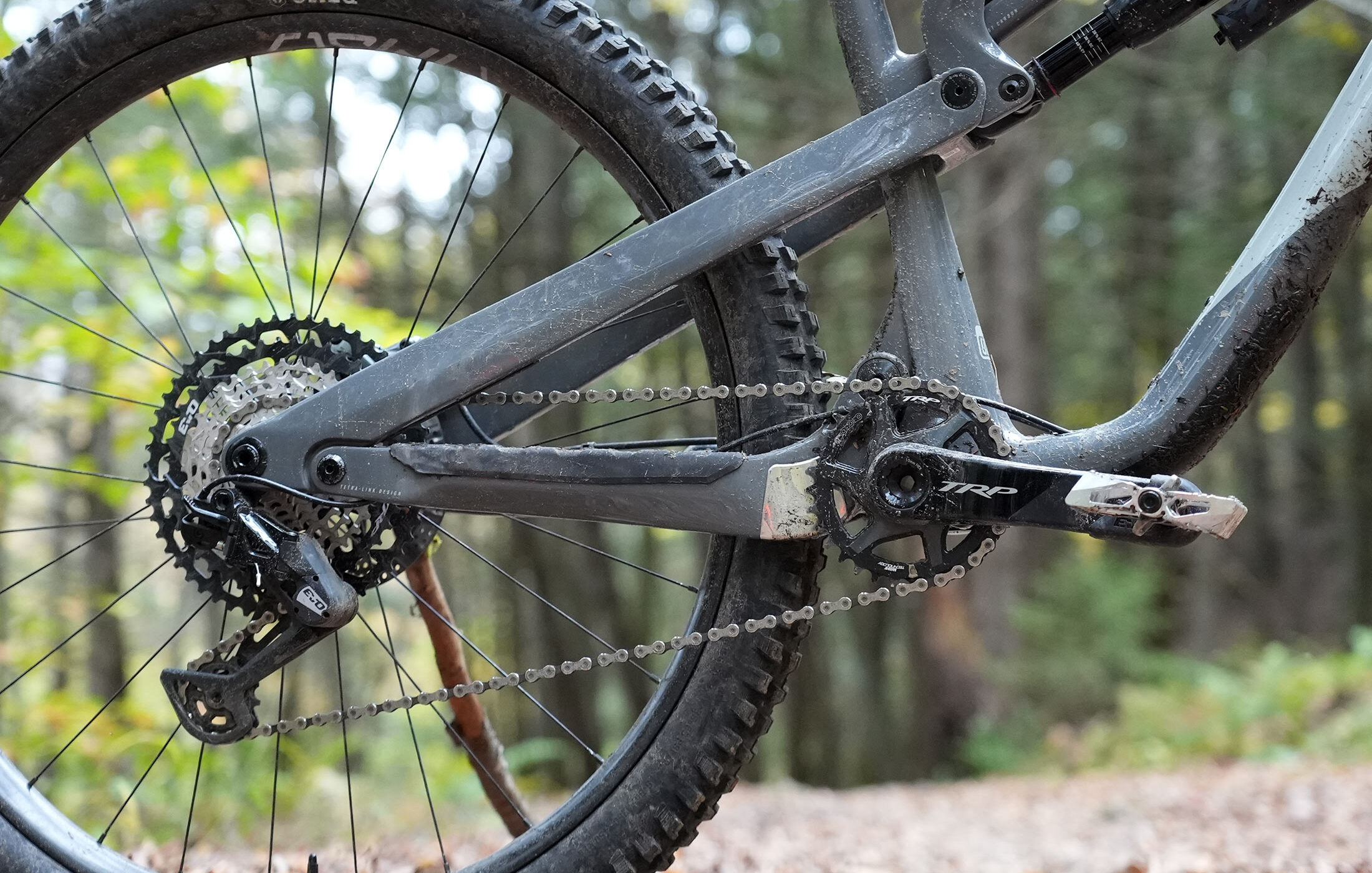You might be wondering why TRP (or anyone) would bother with the development and production costs to bring a fully modern, feature-rich mechanical drivetrain to market when everything around them is going electric. And not just electric; wireless. Even many frames are opting to be “wireless only”, losing the cable ports necessary to install mechanical groups on them.
But then you might remember that driving a stick shift car is still a whole lot of freakin’ fun. And not having to worry about batteries being charged is nice. And sometimes you’re building a bike for someone (a spouse, or kid, for example) who doesn’t give a crap about wireless and would never charge their batteries but you want them to have good parts because good parts make the experience better for them.
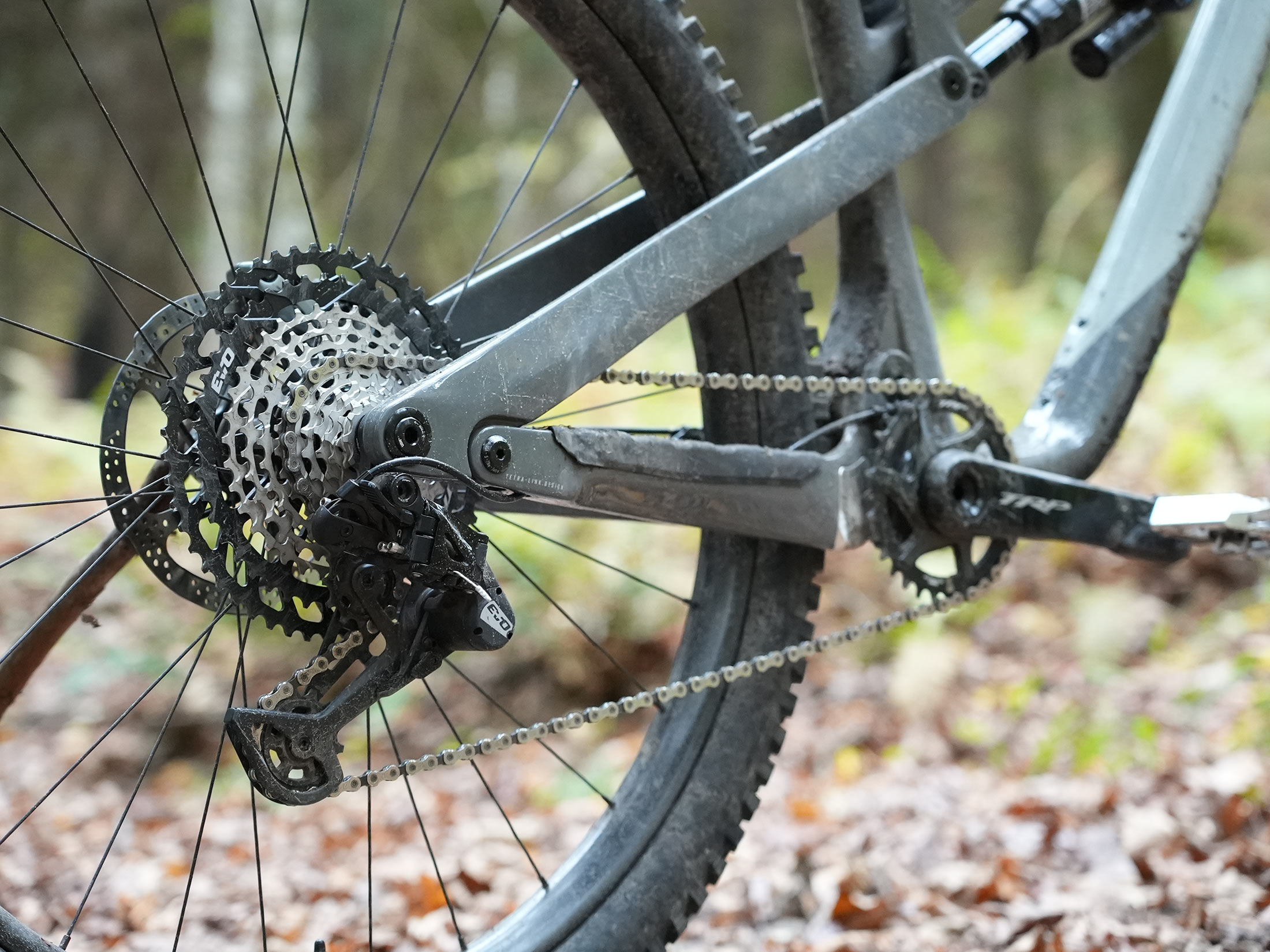
For all of those reasons and more, a really good mechanical groupset still makes a lot of sense. So, perhaps, TRP realized that the market is still there, but the competition is leaving, and therefore a door has opened.
My speculation is (and there are signs that I’m right) that lots of people still want a good mechanical mountain bike group.
After riding the new TRP EVO 12 group for some time, I’d say we’ve found it. Here’s why, plus actual weights for each part…
TRP EVO 12 actual weights

Left to right:
- Crankarms – 502g (w/boots, 170mm)
- Chainring – 82g (32-tooth)
- Cassette – 374g (10-52, Microspline compatible)
- Chain – 273g (uncut, w/ quick links, KMC)
- Bottom Bracket – 89g (BSA for 30mm spindles)
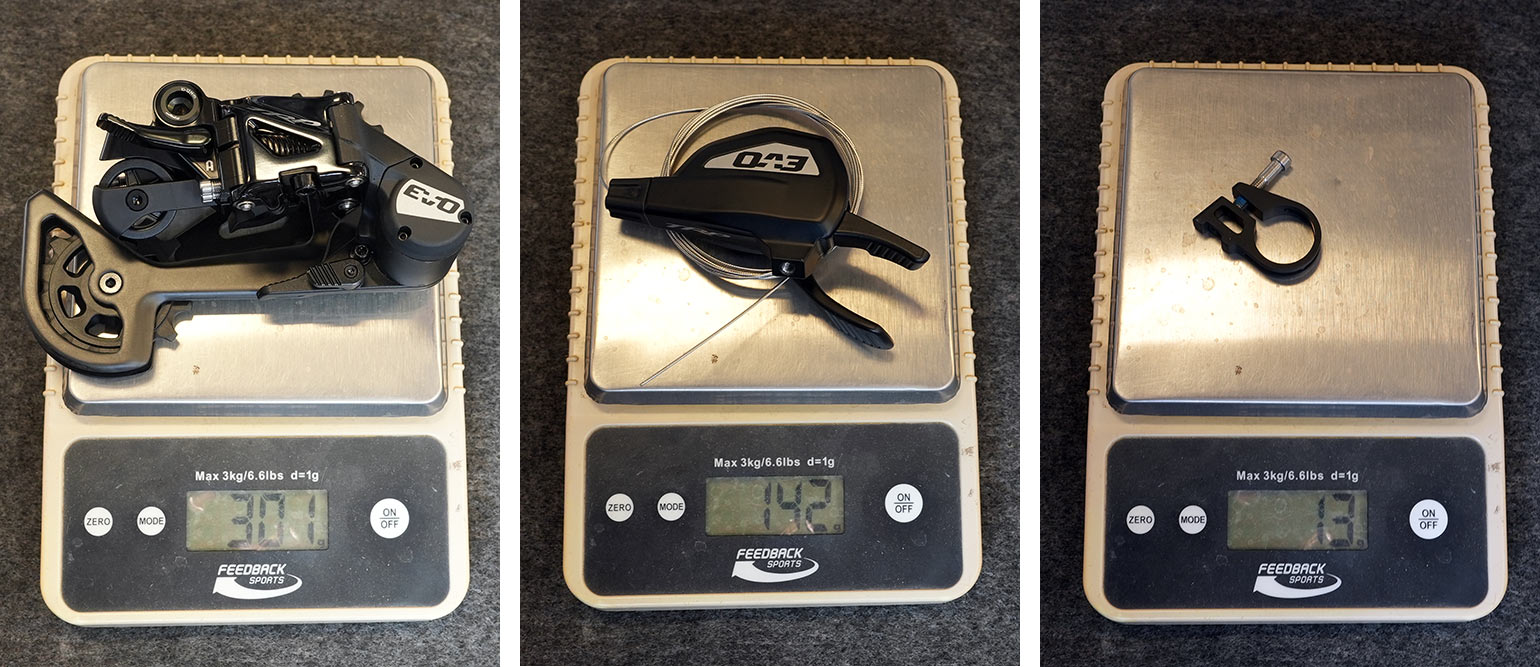
- Rear Derailleur – 301g
- Shifter – 142g (w/ cable)
- Shifter Mount – 13g (w/bolt)

I paired the group with TRP DH-R EVO brakes, which are phenomenal. Massive power and great modulation. Feedback is appropriate and drama-free, and the power comes on very linearly, making them easy to modulate. This is my second bike with them and I highly recommend them. Weights are:
- Calipers w/ uncut hoses – 201g (per wheel, prefilled with Mineral Oil)
- Levers – 132g to 133g (pre-filled with Mineral Oil)
TRP ships all brake calipers with the same length hose, hence the identical weights for both calipers. That means just one single SKU per model, which makes it easier for them to ship and for shops to stock…just cut to length. Levers are directional, though, so be sure to order a left and right…and a good bleed kit if you’ll be servicing them yourself (TRP’s bleed kit isn’t great).

I ended up going with the Center Lock rotors, but weighed two 6-bolt rotors also.
- 223mm 6-Bolt Rotor – 268g (2.3mm thick)
- 203mm 6-Bolt Rotor – 239g (2.3mm thick)
- 203mm Center Lock Rotor – 191g (2.3mm thick)
- Rotor Bolts x6 – 13g
- Rotor Lockrings – 9g each
Notes about the rotors:
- TRP makes 1.8mm thick rotors in all variants, too, but I (and they) recommend the thicker 2.3mm models for better heat management, especially for e-bikes. They’re stiffer, too, so there’s less chance of vibration squeal.
- I used the Center Lock rotors with a 203mm front and a last-minute swap to a 180mm rear to save a few grams (didn’t weigh it). Chasing Cody Kelley down ultra-steep ninja trails in Park City had me rethinking that, but for the rest of my rides, this mixed-size setup was fine.
- The two Center Lock lockrings are the two standards on the market, one using a cassette lock ring tool and one a BB tool. The smaller one that uses a cassette lockring tool will only work for 12mm thru axles…larger 15mm thru axles (like those on MTB forks) won’t fit through it. So, for MTBs, best to just use matching sets of the bigger ones.
TRP EVO 12 tech & features
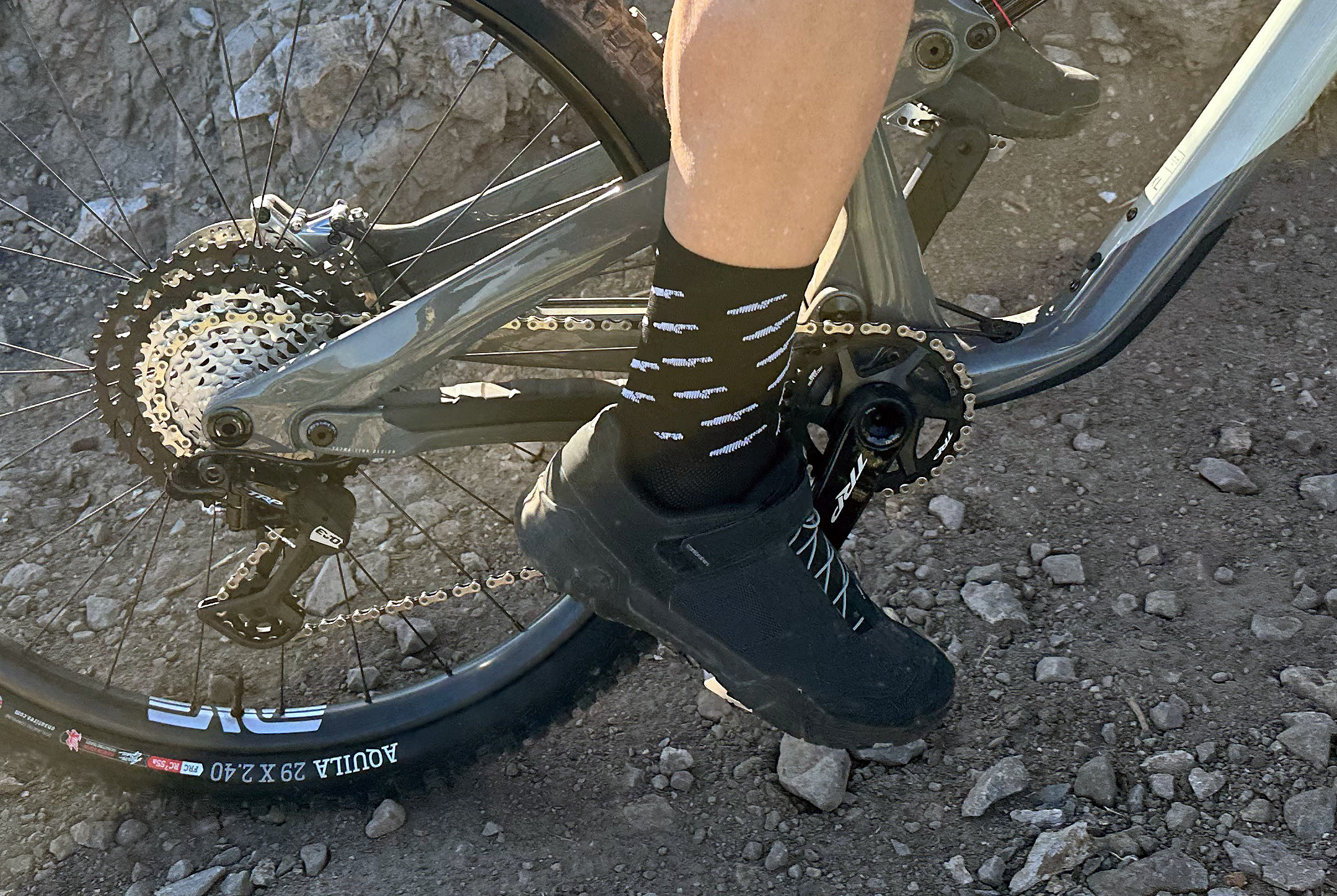
The TRP EVO 12 group comes in silver and gold, with those colors showing on the cassette cogs plus graphics and pieces across all of the components. You can color match either with their DH-R EVO brakes, too.
I opted for silver because it matches this colorway on Fezzari’s La Sal Peak enduro bike. TRP’s U.S. HQ is in Utah, just down the road from ENVE and Fezzari, so I worked with both brands to get the rolling chassis built. I’ve reviewed the La Sal Peak before, but I’ll sprinkle a few notes in here, too. The fact that I asked to use it as a platform for this build should say a lot. The ENVE wheels are the Foundation Series AM30 MTB wheels, which just dropped in price and offer an exceptional deal on a great wheelset. Look for a separate review of those and other bits from this bike soon.
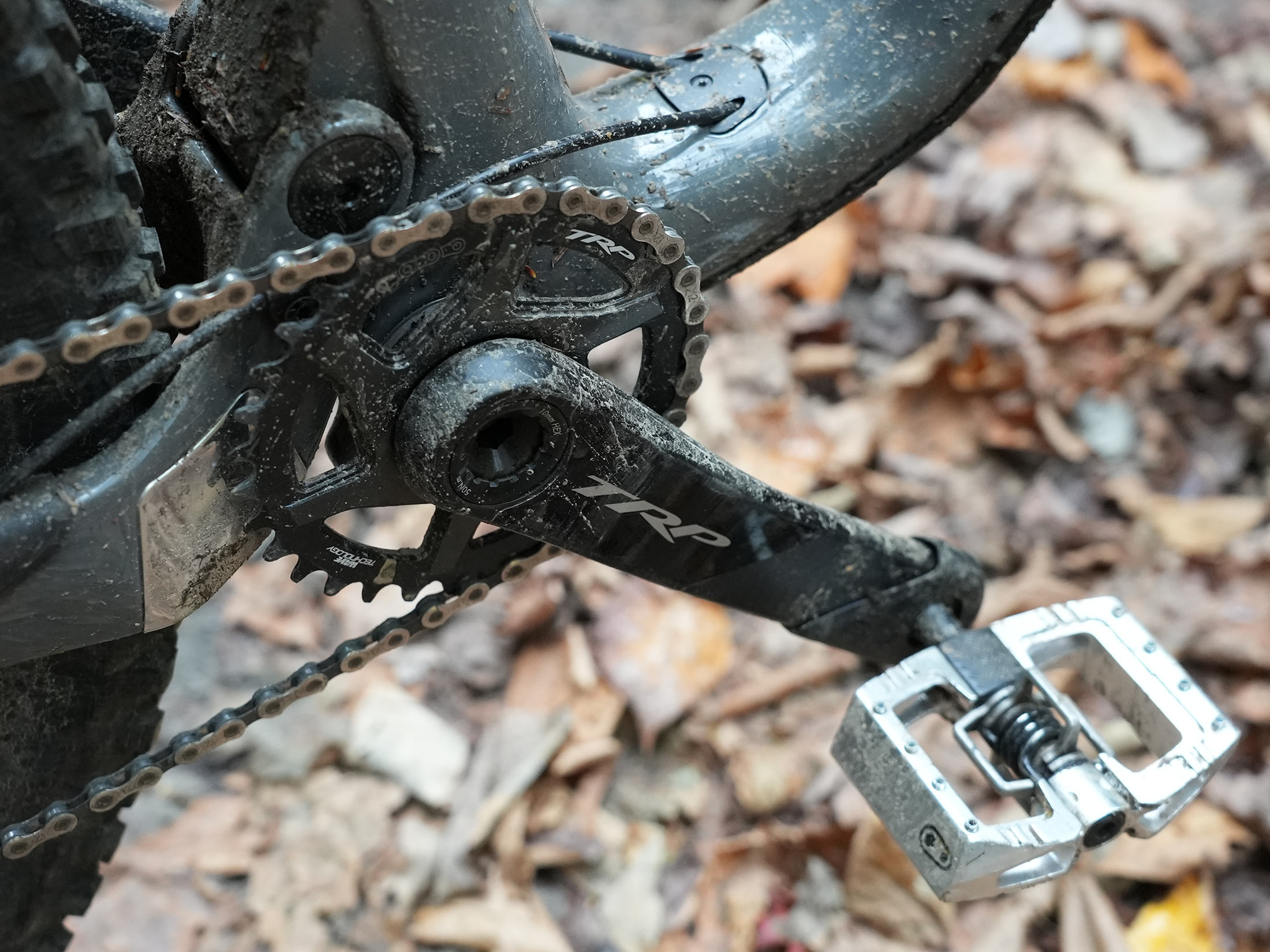
TRP’s EVO 12 cranksets come in carbon and alloy versions. I’m testing the carbon ones and, like all carbon cranksets, riding in mud and grit will rough up the surface.
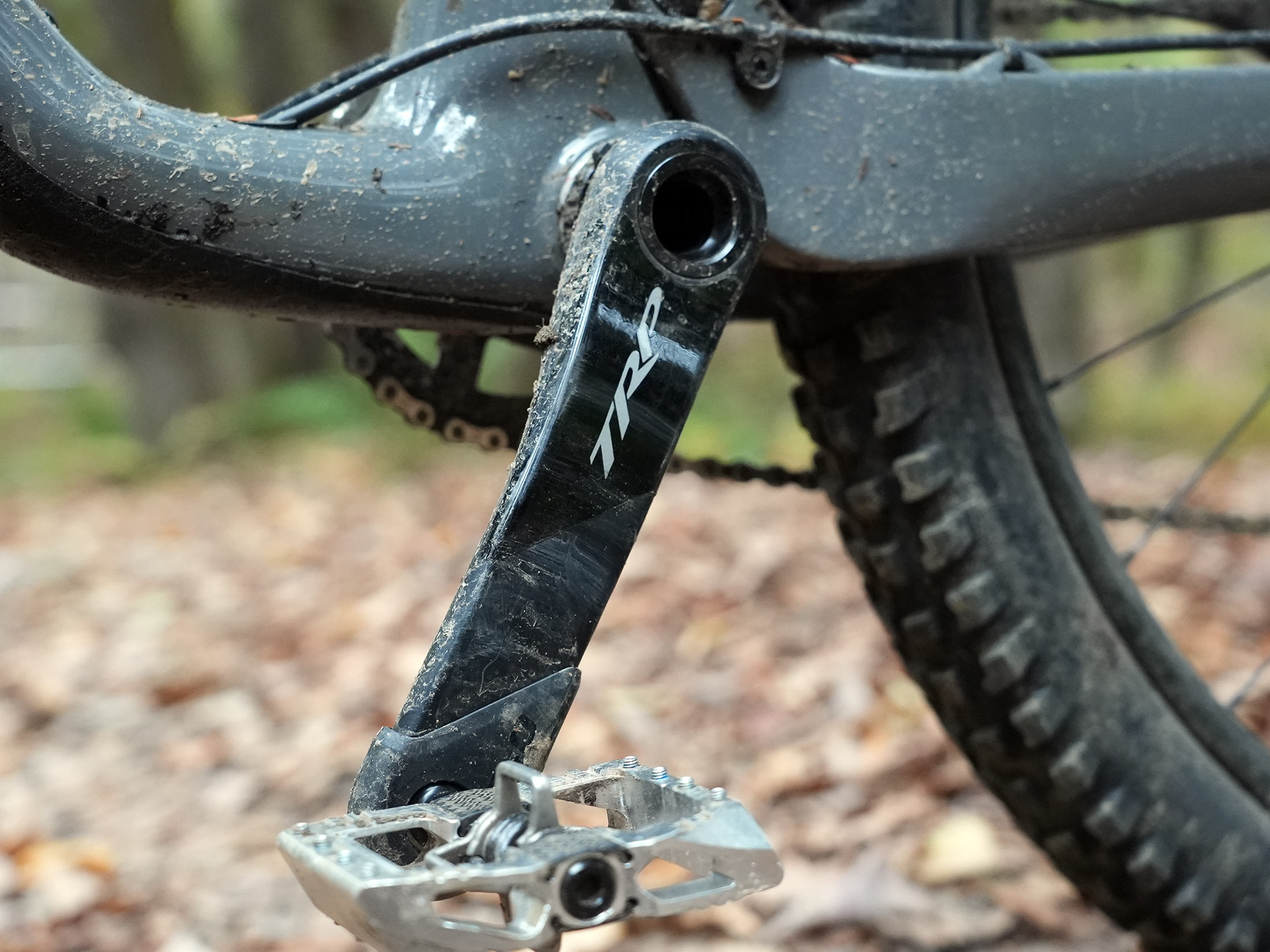
Fortunately, TRP covers the outer face with a protective tape that’s holding up well. Rubber endcap boots are included and have extended lower coverage to protect them if you pedal into/onto a rock.
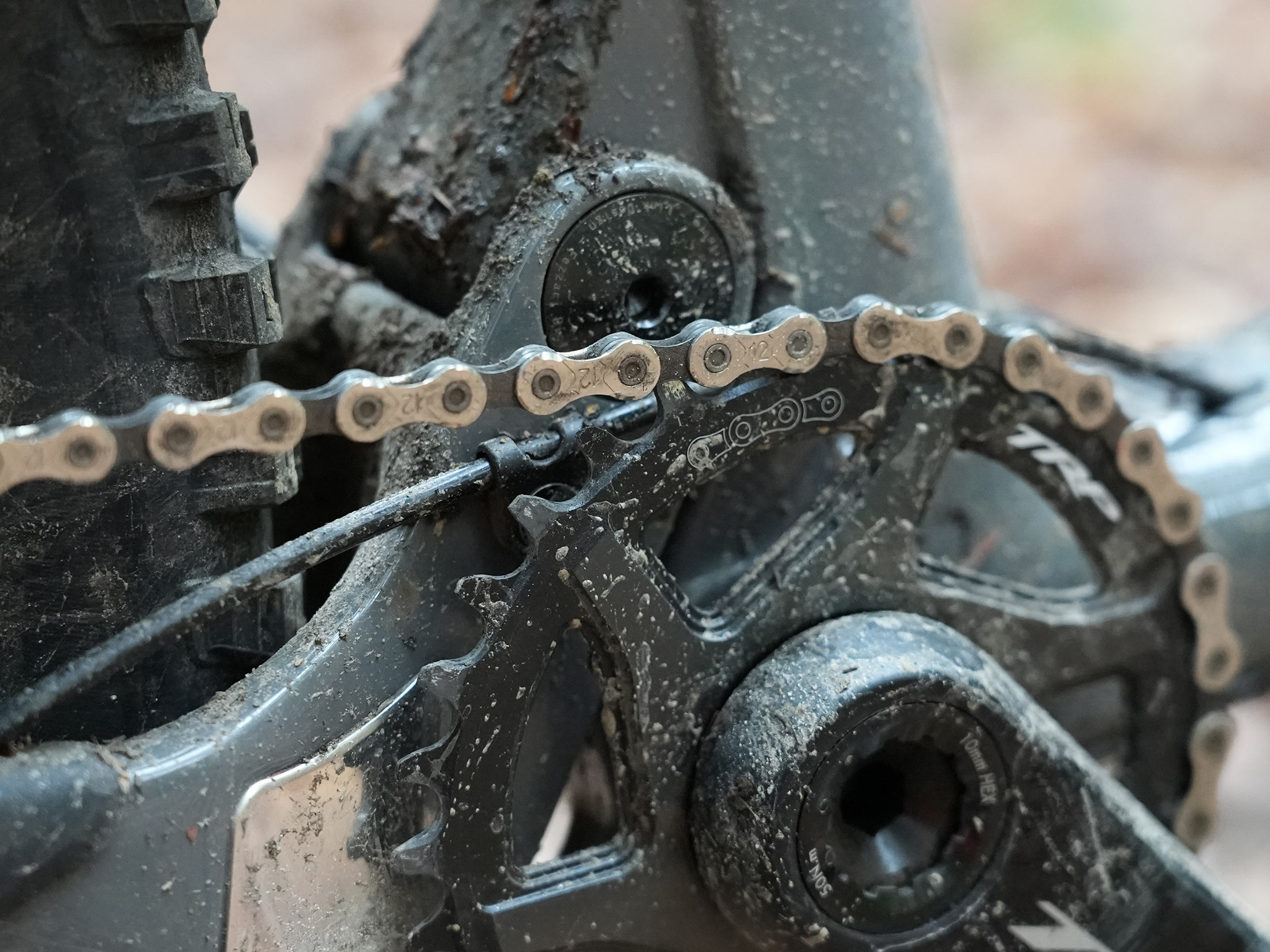
The chainrings come in 30/32/34 tooth counts and use a direct mount design. The teeth alternate with a wave pattern (like MRP’s chainrings) rather than a narrow-wide profile. It works great, especially in conjunction with the dual chain-retention features on the rear derailleur.
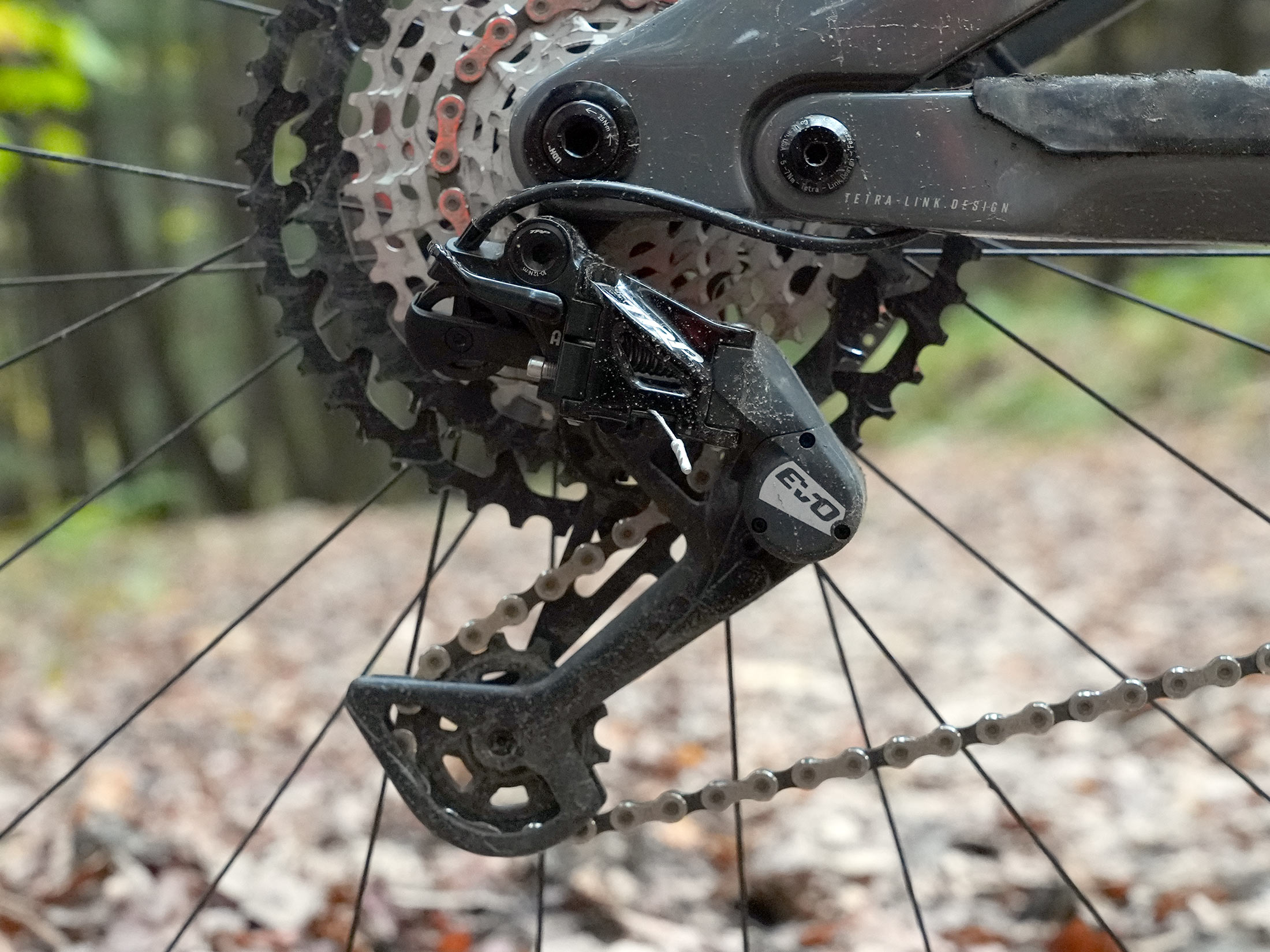
All modern MTB derailleurs have a clutch, but TRP takes it further. The carbon fiber pulley cage mounts to their silent clutch, which prevents it from bouncing around. Then the Hall Lock prevents the entire derailleur body from rotating around the mounting bolt.
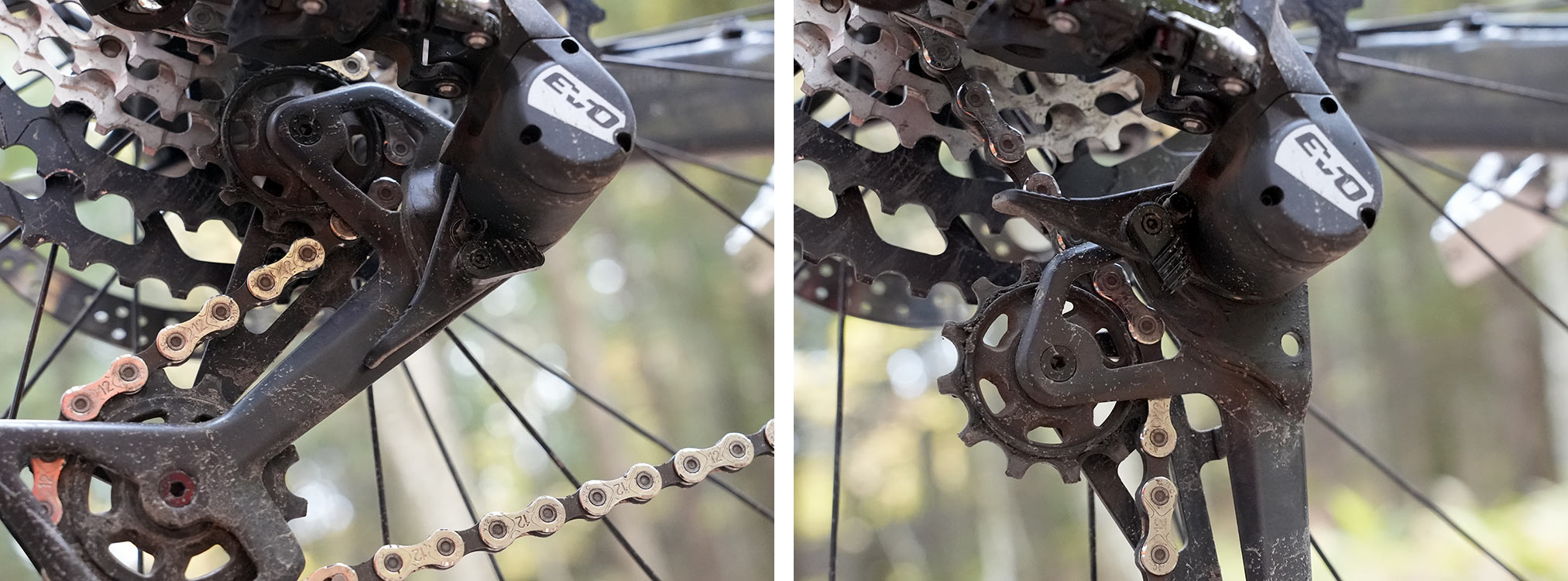
To release the chain tension for wheel swaps, there’s a two-part Cage Lock lever. Pull the small lever outward to remove the pin from the hole in the cage…that’s what locks it into the clutch. Then flip the big lever up to release the clutch and the cage dangles freely…
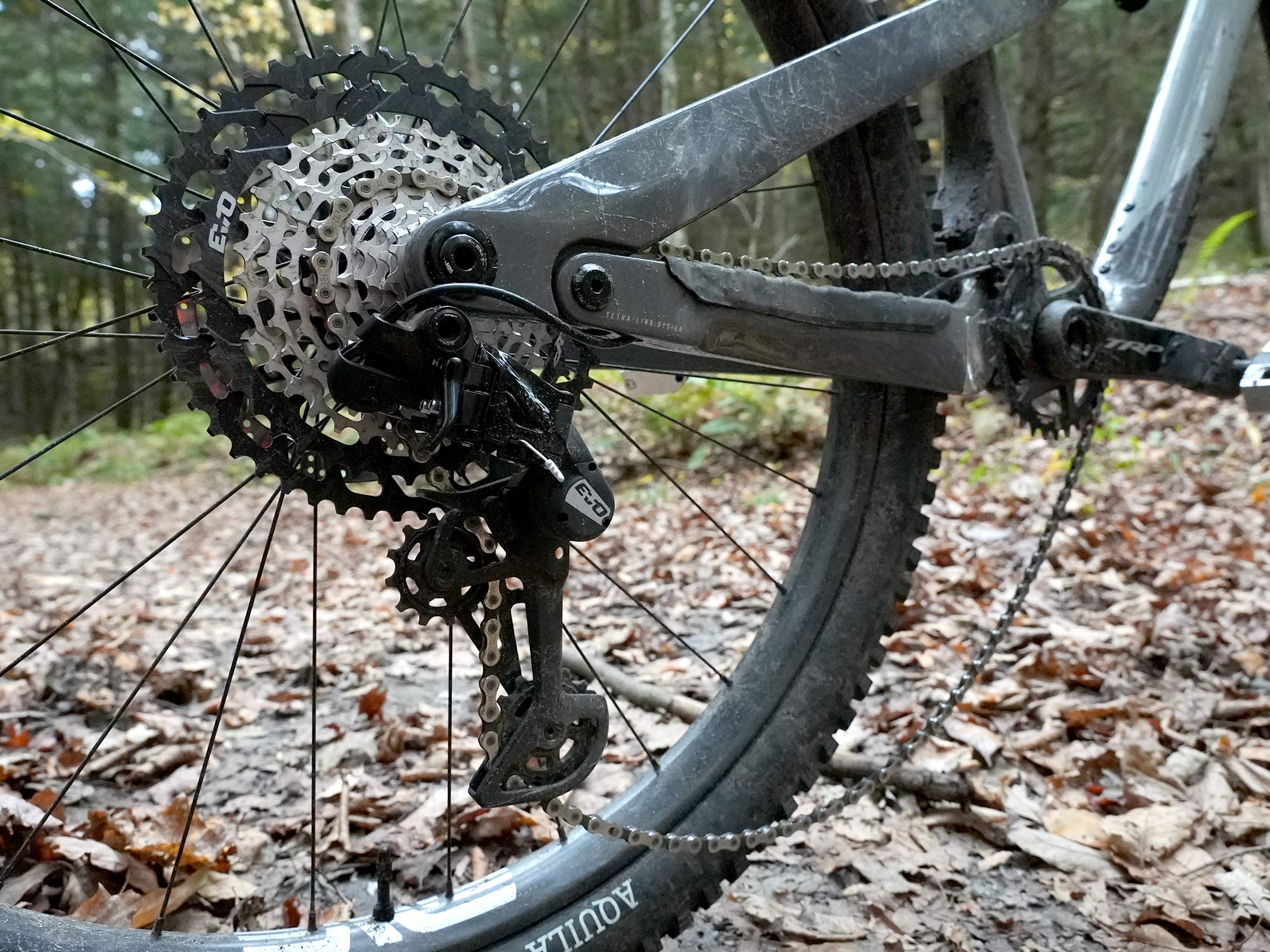
…adding slack to the chain.
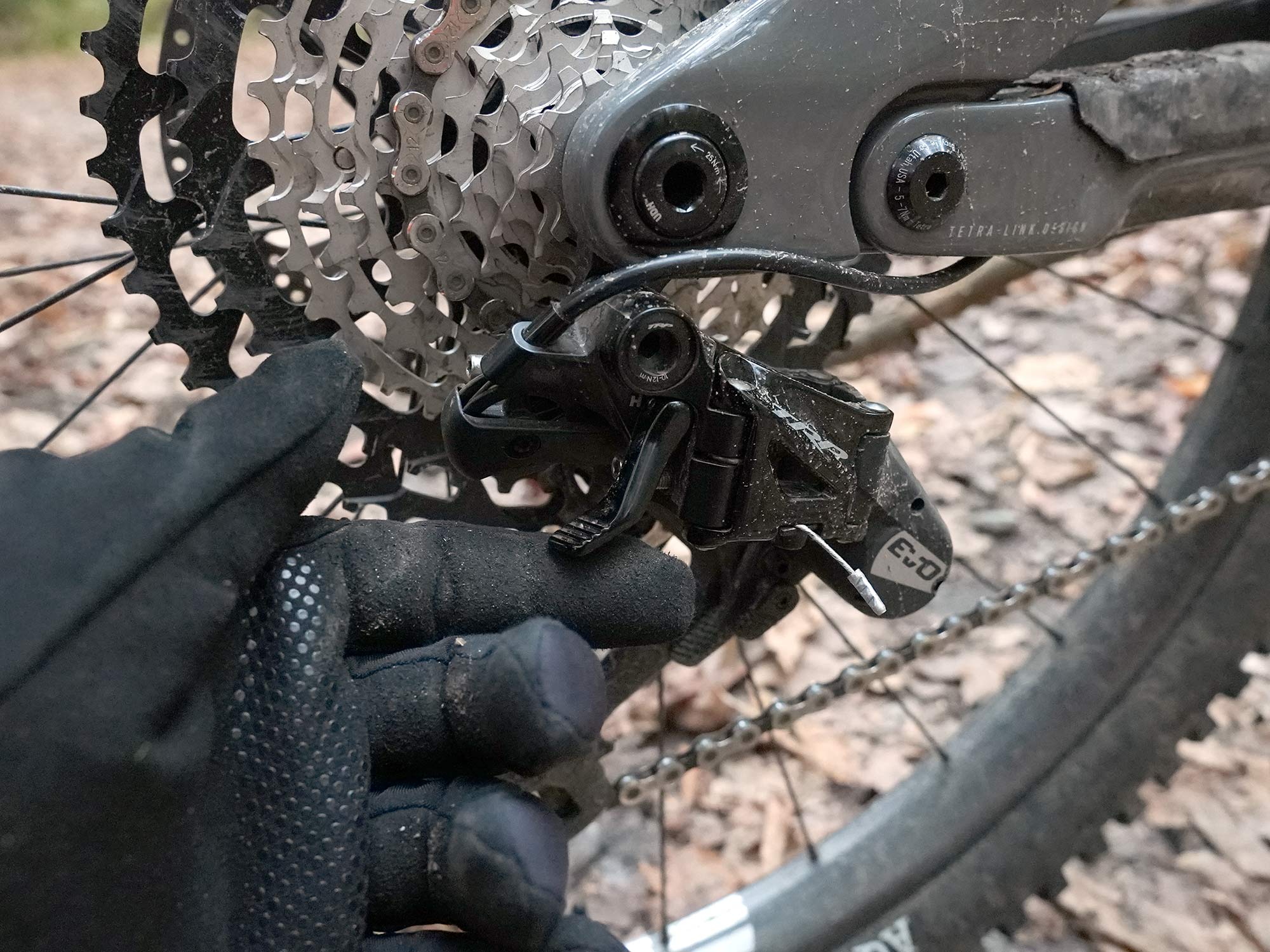
Even with the pulley cage held tight by the clutch, the derailleur can still pivot around the mounting bolt. Why? Because they started out making their high-end derailleurs with a 7-speed downhill version.
TRP tapped Aaron Gwin to help test it, and he found that the derailleur movement was enough to make noise on rougher downhill tracks. So they added the Hall Lock, named for Gwin’s mechanic John Hall, which tightens the B-knuckle around the bolt, eliminating its ability to pivot.
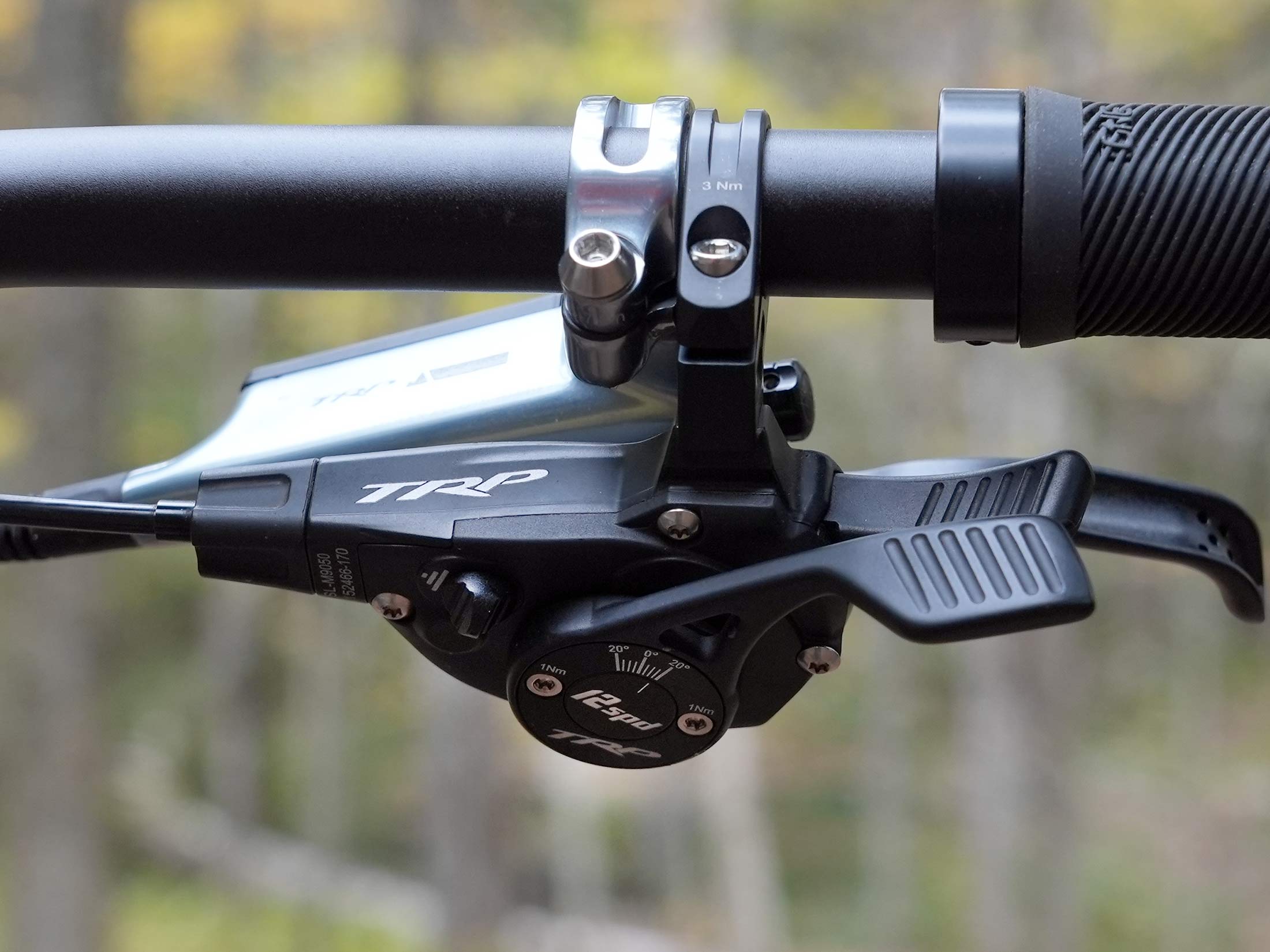
The shifters add another unique feature. The lever for downshifts (to an easier gear) has an adjustable angle, similar to higher-end SRAM trigger shifters. But it also adds a small switch that lets you choose single- or multi-shifts. Choose single shifts for e-bikes where you don’t want to jam up the chain by trying to move across up to five cogs at once under high torque. But I prefer multi-shift for regular bikes, letting you push it further to get more shifts at once.
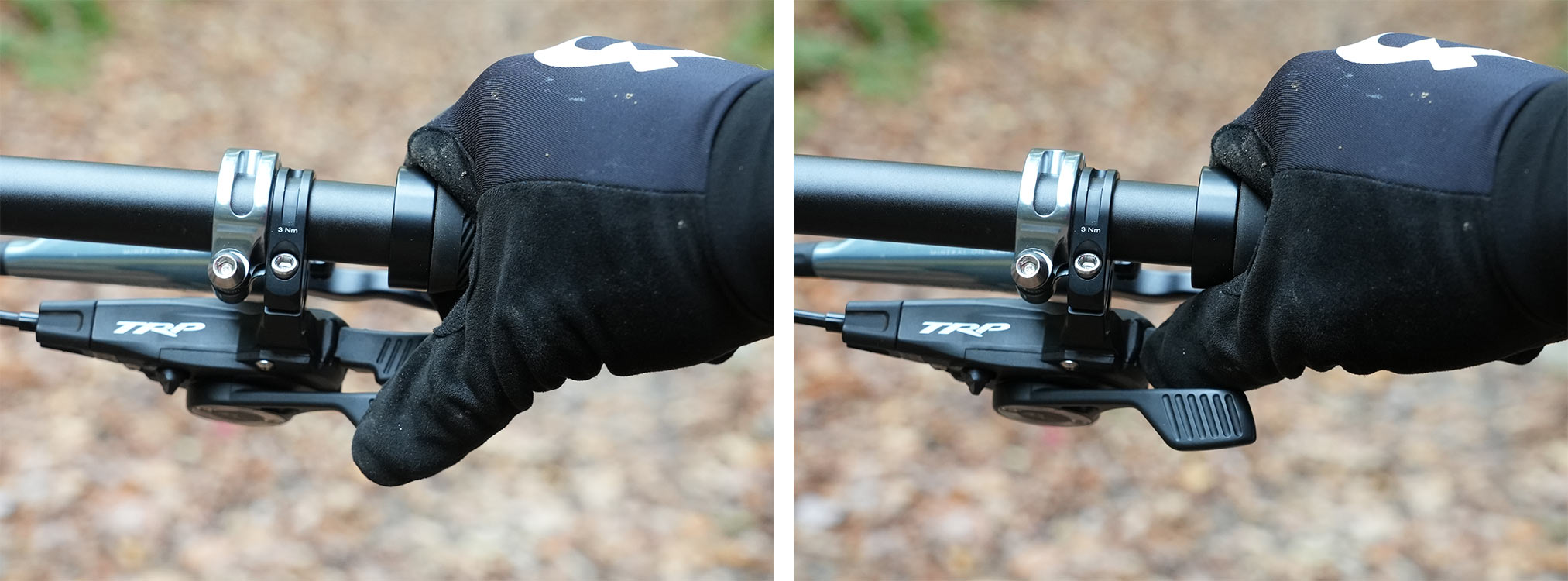
The paddles are large, easy to find, and have enough texture. It wouldn’t hurt if they were a bit rougher or had more friction, but I never had a finger slip off, even when riding a wet trail (but not in the rain, so can’t really speak to shifting when they and my gloves are soaking wet).
The only minor issue I have is that there’s not a ton of space between the main paddle and my grip. That creates a somewhat tight space for large thumbs or loose gloves trying to reach the release trigger. I imagine thick winter gloves might have more of a problem, but it will also depend on your grip diameter.
The shifter can be mounted with the brake lever’s fixed mounting bracket using a MatchMaker-style adapter, but I chose to use a standalone mount to give me more flexibility in adjusting both independently of each other.
Notice anything else? The shifter’s cable routing runs parallel to the bar, not out at an angle, so it’ll look nice and clean on modern frames with stealth routing, too. You can imagine where their brakes are heading…
TRP EVO 12 ride review
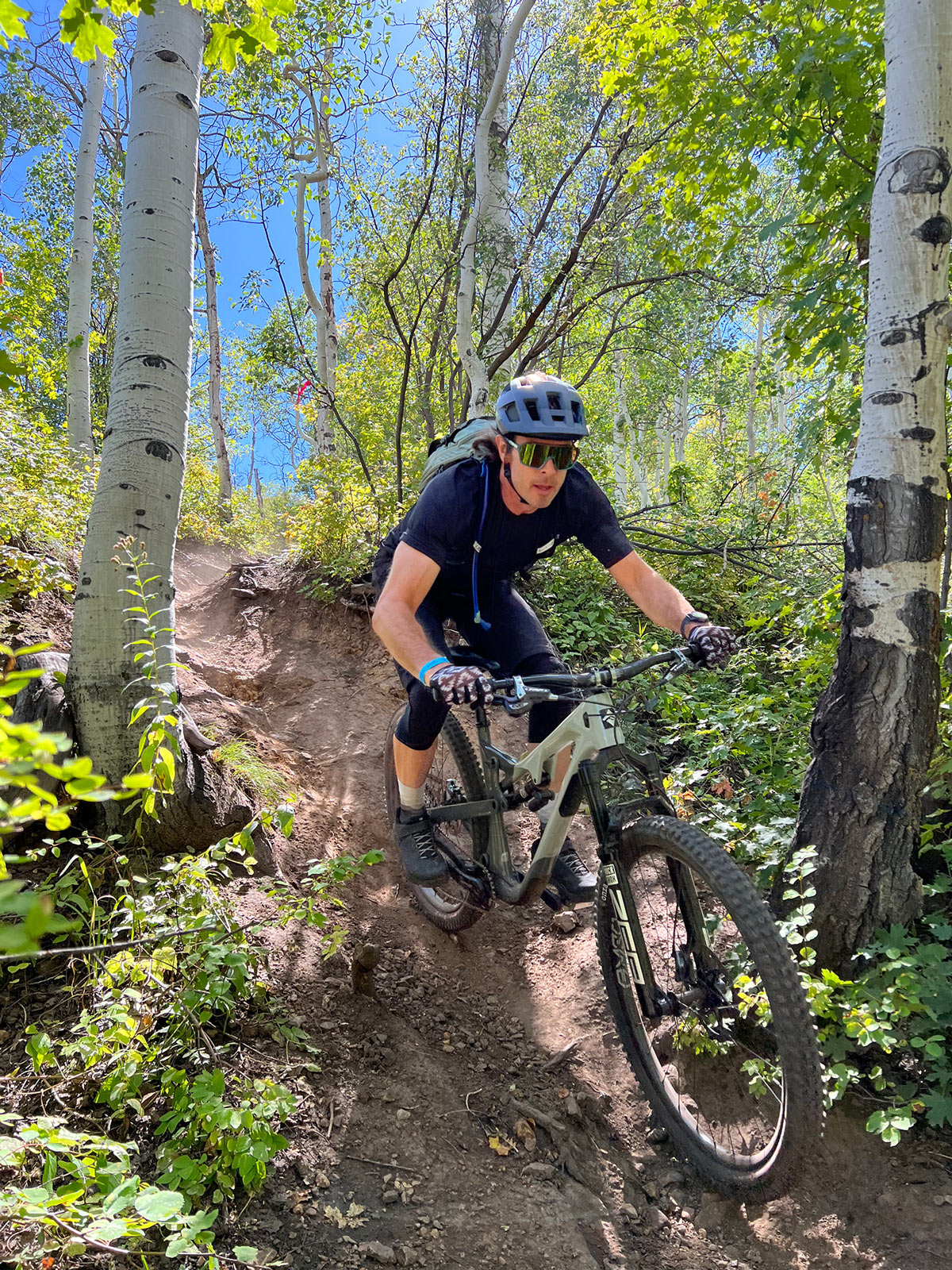
My first chance to ride the TRP EVO 12 group was in Taiwan at the launch. There, I rode an Intense Primer, an XC/Trail bike on a short XC-ish singletrack loop.
The rest have been on the Fezzari La Sal, a longer travel 170mm enduro bike on bigger, rougher trails. It’s a group designed to work well on any of those bikes, from short- to long-travel, XC to Enduro. And it does.
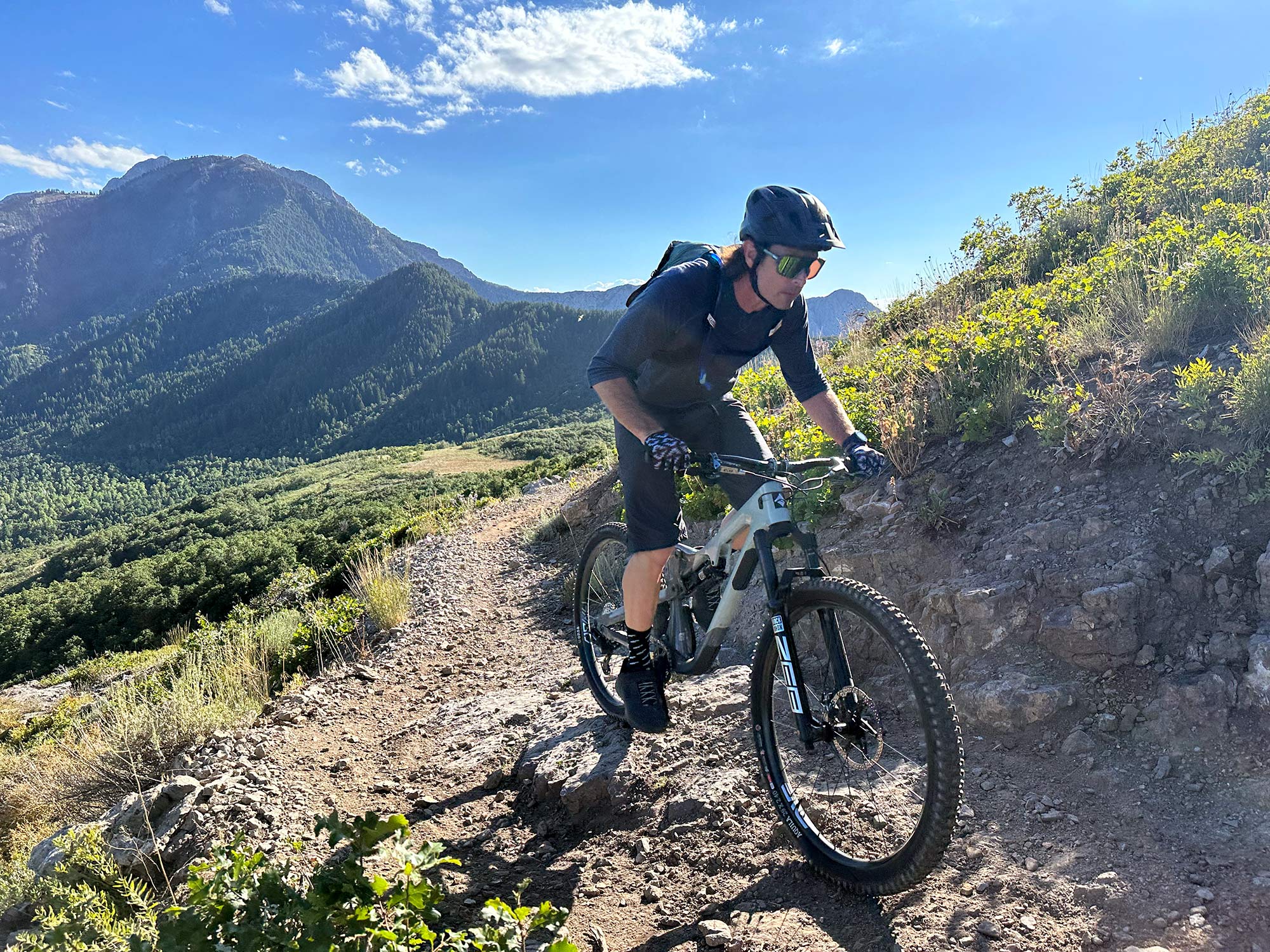
First stop, Park City, Utah, for hot laps with the TRP crew and their sponsored enduro racer, Cody Kelley. Ripping descents is fun and a great test of the derailleur and chainring’s ability to keep the chain in place, but the group’s real job is to shift well and propel you forward.
Utah’s bountiful trail networks make you earn those turns with long climbs, full of chunk and loose bits. The TRP group shifted confidently under pressure with a refreshingly sharp mechanical feel. They don’t make the chain, that’s from KMC, but it all works well together.
Shifts are precise and mostly smooth. There is a hint of… something. It feels like maybe the tooth shaping on the cassette cogs could use a hair more refinement. It’s not fair to call it rough. It’s definitely not clunky; far from it.
Comparing it to Shimano’s mechanical shifting isn’t fair either as the Japanese giant has spent decades making theirs supremely silky. I almost didn’t want to mention it, because I also kinda like it. Let’s call it… personality.
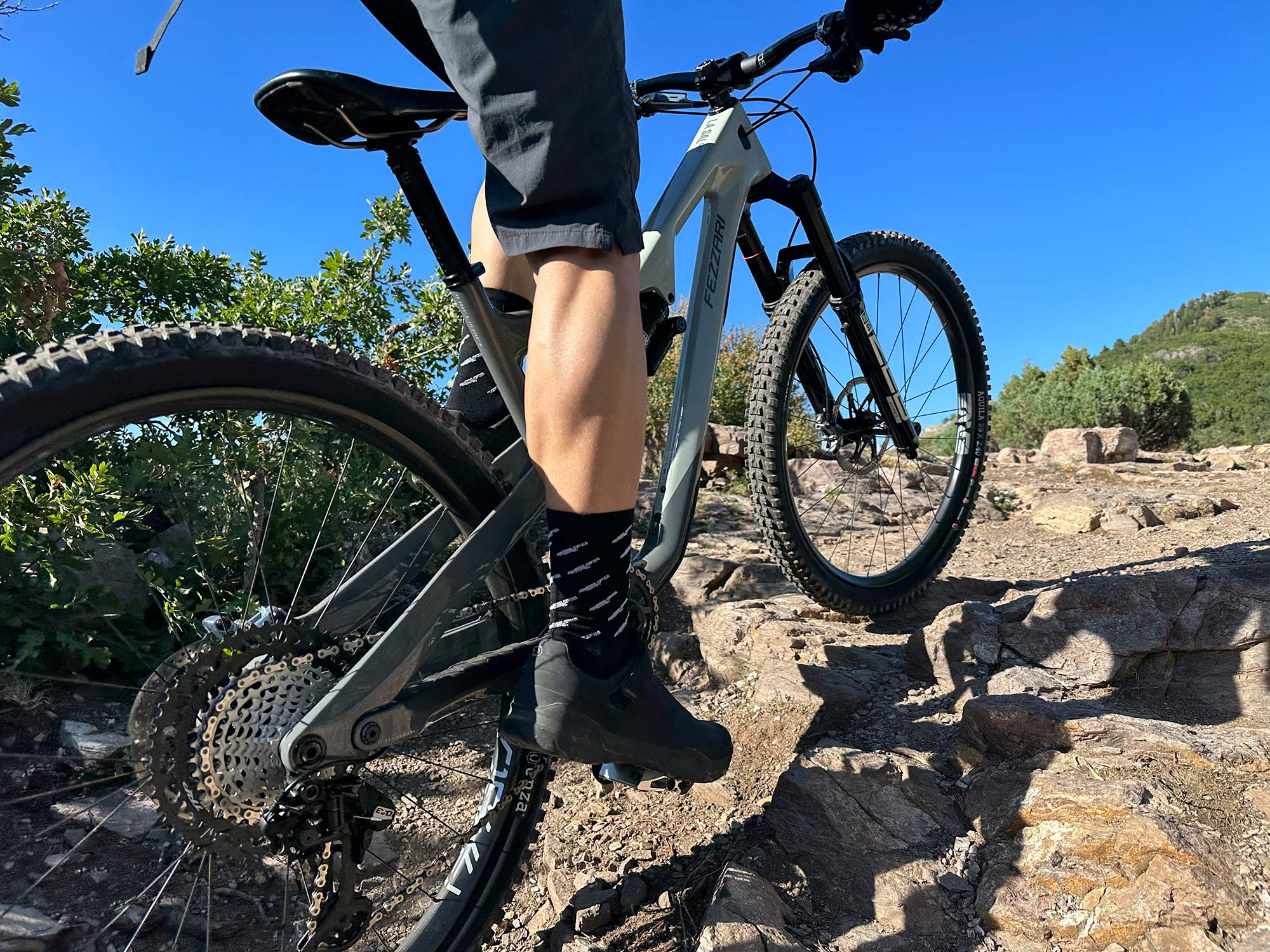
All that said, the nutshell version is this: It shifts great, is super stable, and can even shift well under power on a climb. If you’re used to another mechanical group, it’s going to feel different. Not quite as polite as Shimano, but maybe more direct? Very similar to SRAM XO, just…different, with some clever features.
Side note: The La Sal Peak’s frame handles all of the torque of unseated climbing well, efficiently turning it into forward motion without any twisting or flex. That’s important with 12-speed groups because the space between cogs has gotten so tight (and why brands are pushing electronic shifting that won’t change over time), that any frame flex could cause irritable shifting performance or ghost shifting.
As with any mechanical group, you’ll need to adjust for “cable stretch” through the first few rides. I have, and since then shifting has remained spot-on.
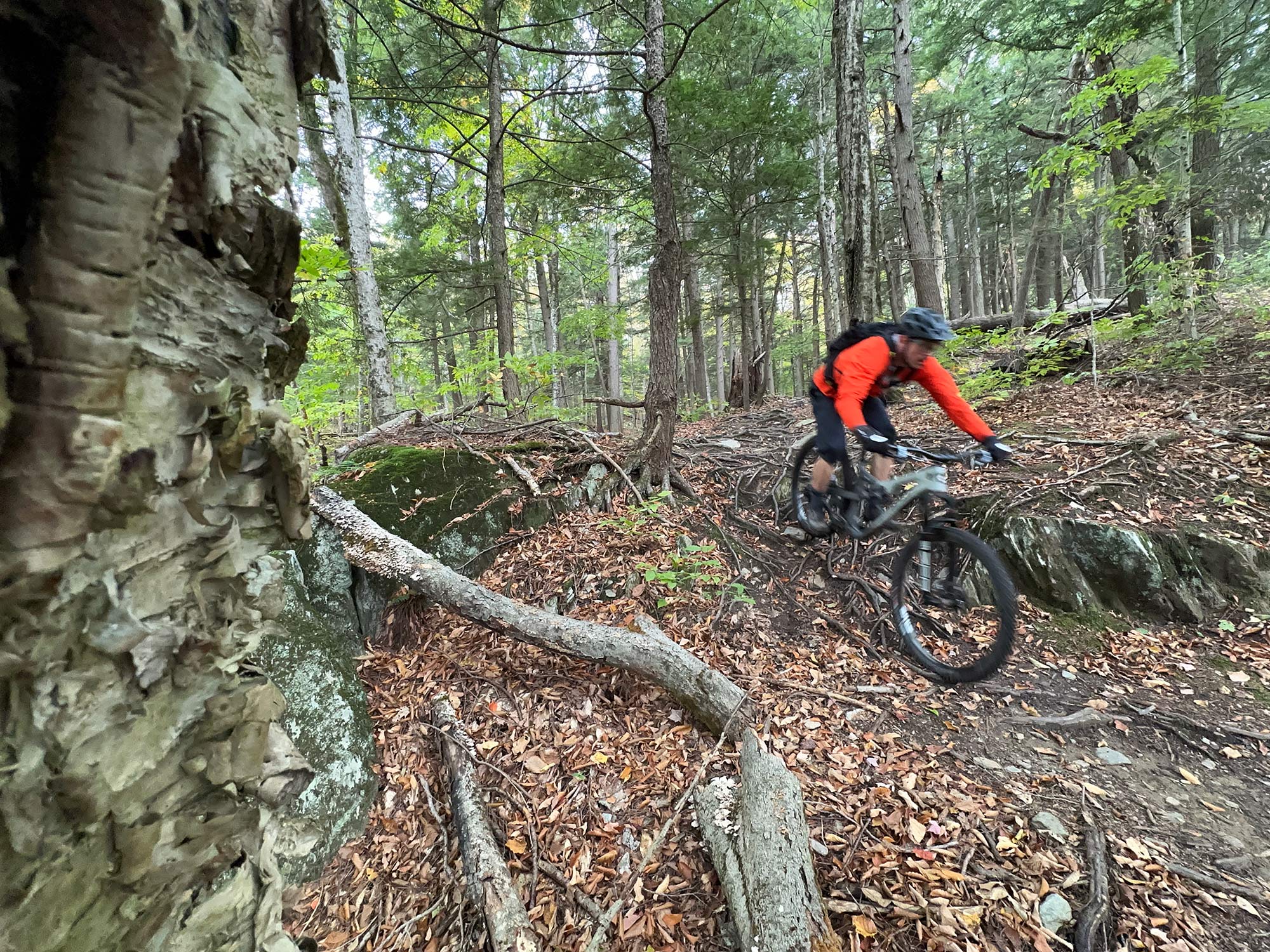
My second big outing with this bike was a couple of days in Vermont’s incredible (and incredibly vast) trail network. The terrain couldn’t be more different from Utah, trading dry dust for wet dirt, full of rocks and roots.
Vermont also has mountains, with sustained technical climbs full of switchbacks and punchy steeps that require lots of shifting.
As much as I love the quick little release lever on SRAM trigger shifters (and I do love it), its throw is so short that I often double tap it on rough sections. That never happened with the TRP shifter, both the lever and trigger have just the right amount of throw (not to short, not too long), with a nice tactile click confirming each downshift.
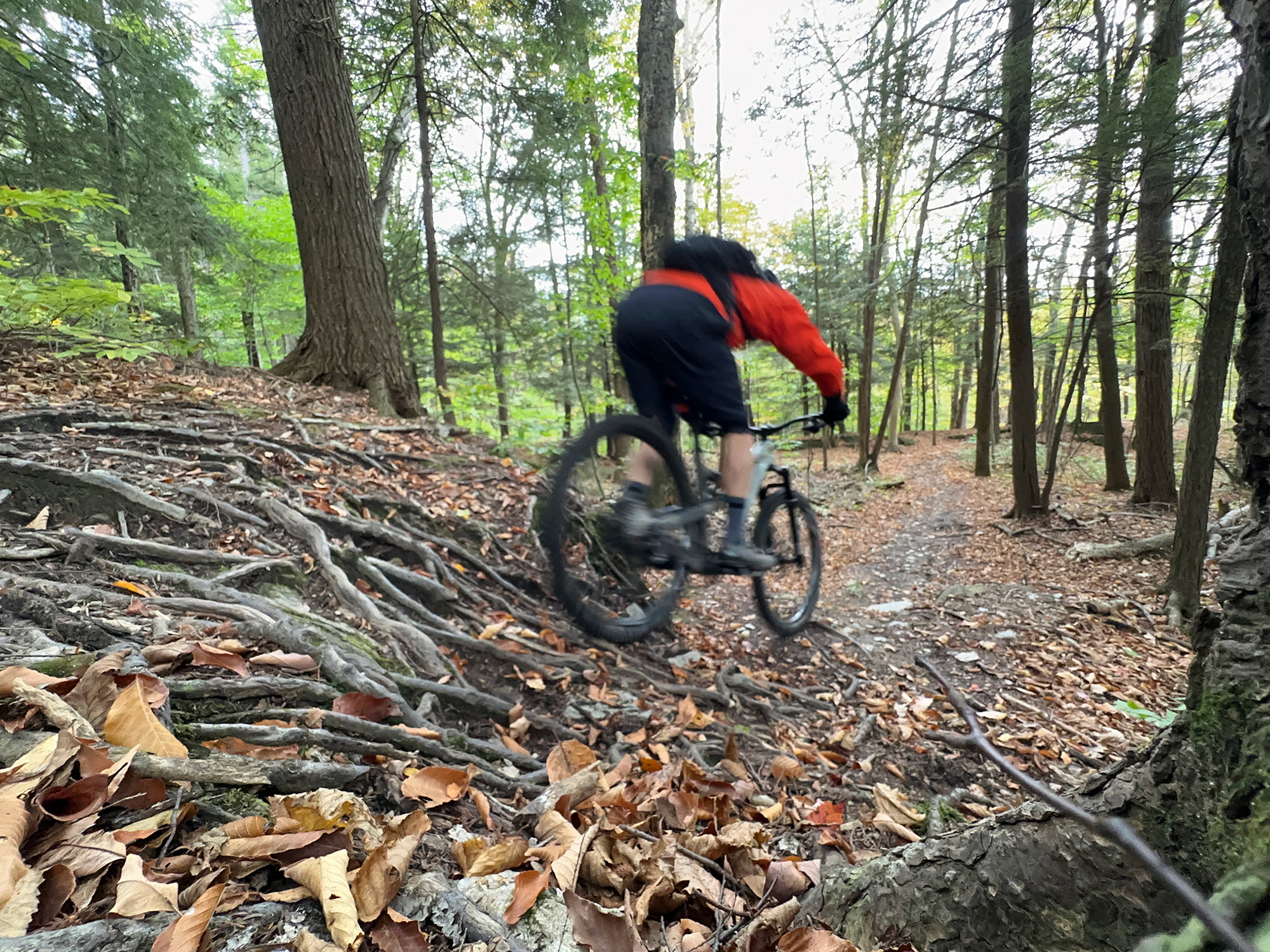
Grinding up the climbs in the 52-tooth cog was quiet and drama-free. It was easy to get into that gear and toggle between the upper three as the climbs gave me short respites.
It had rained a lot the week before I arrived, and a light mist came down on my last day. All of the moving parts got wet and a little muddy, but everything stayed quiet, even the brakes.
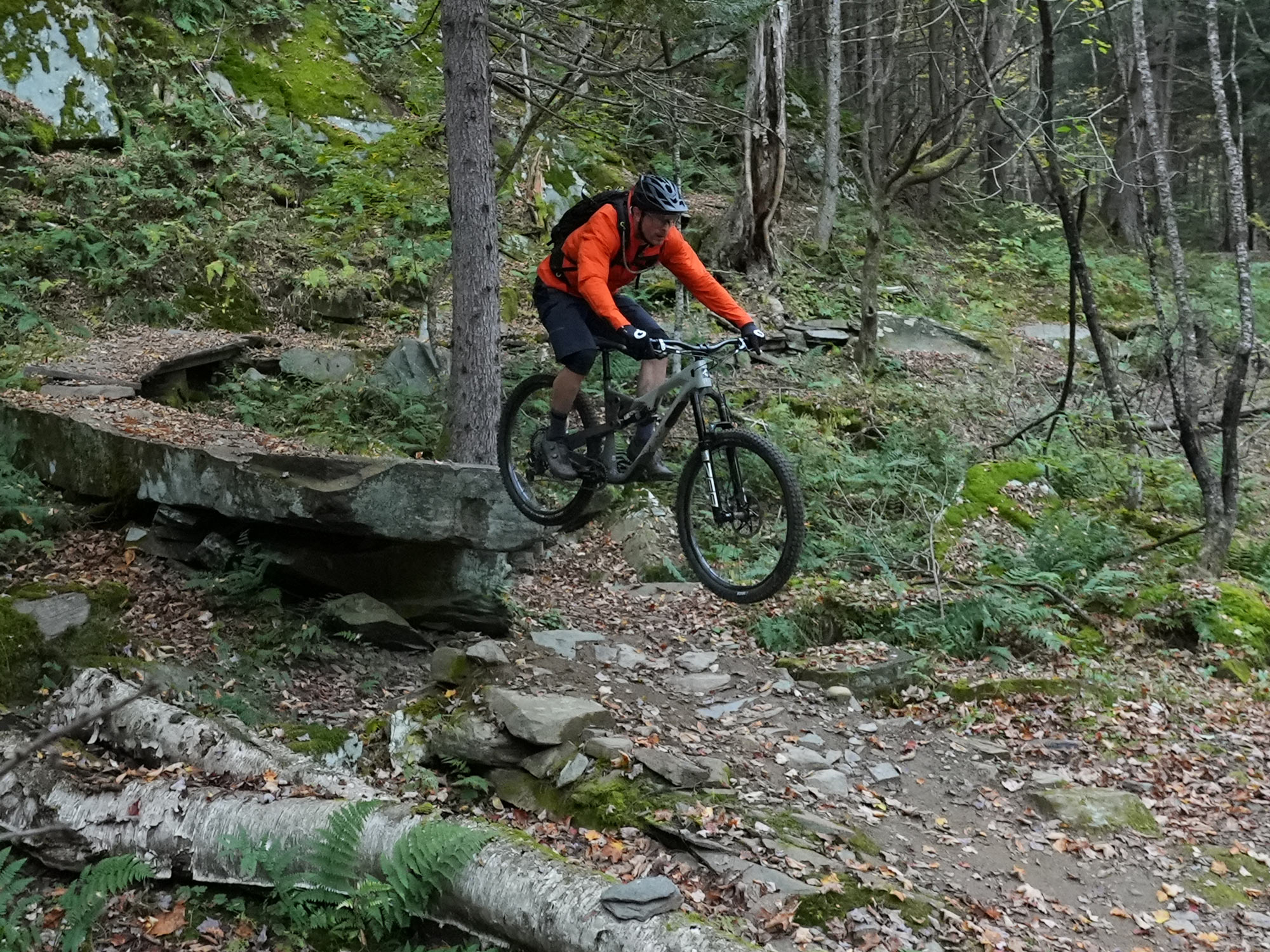
Between rocks, roots, drops, and jumps, I gave the bike plenty of chances to drop a chain, but it’s never happened.
I’ll have the TRP EVO 12 group on this bike for a long time to come. I’ll update this post with any new impressions or changes. Thus far I’ve been impressed, and not just in an “aaaah, it’s a good first effort” kind of way.
I’m impressed in a “Dang, that’s a well-thought-out group with neat features that performs really well” way.
If you’re building a bike from scratch, or upgrading, and prefer mechanical, it’s worth considering. Weights are competitive, pricing is good, and it works great…what’s not to like?
A complete group in silver is $1,244 (with carbon cranks, $1,044 with alloy cranks). Gold parts add about $50 to the total. TRP Cycling’s online drivetrain builder makes it super easy to select colors/options and buy it, too.
